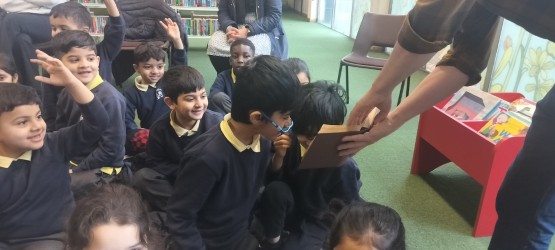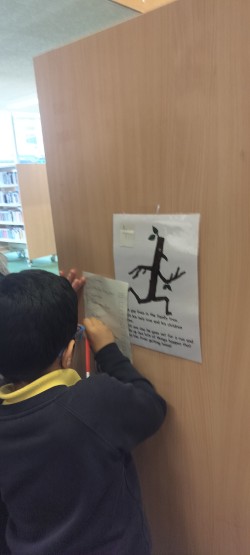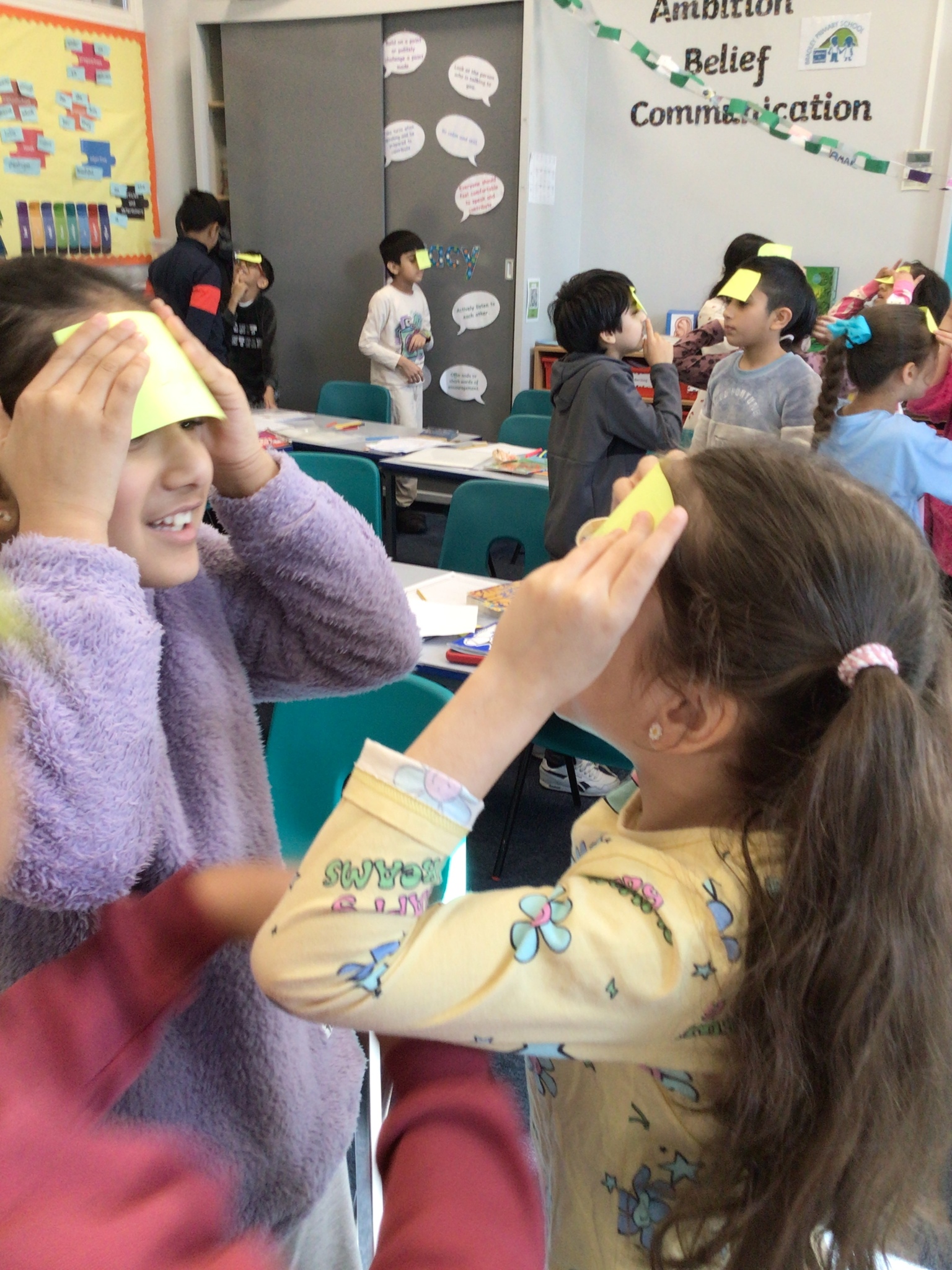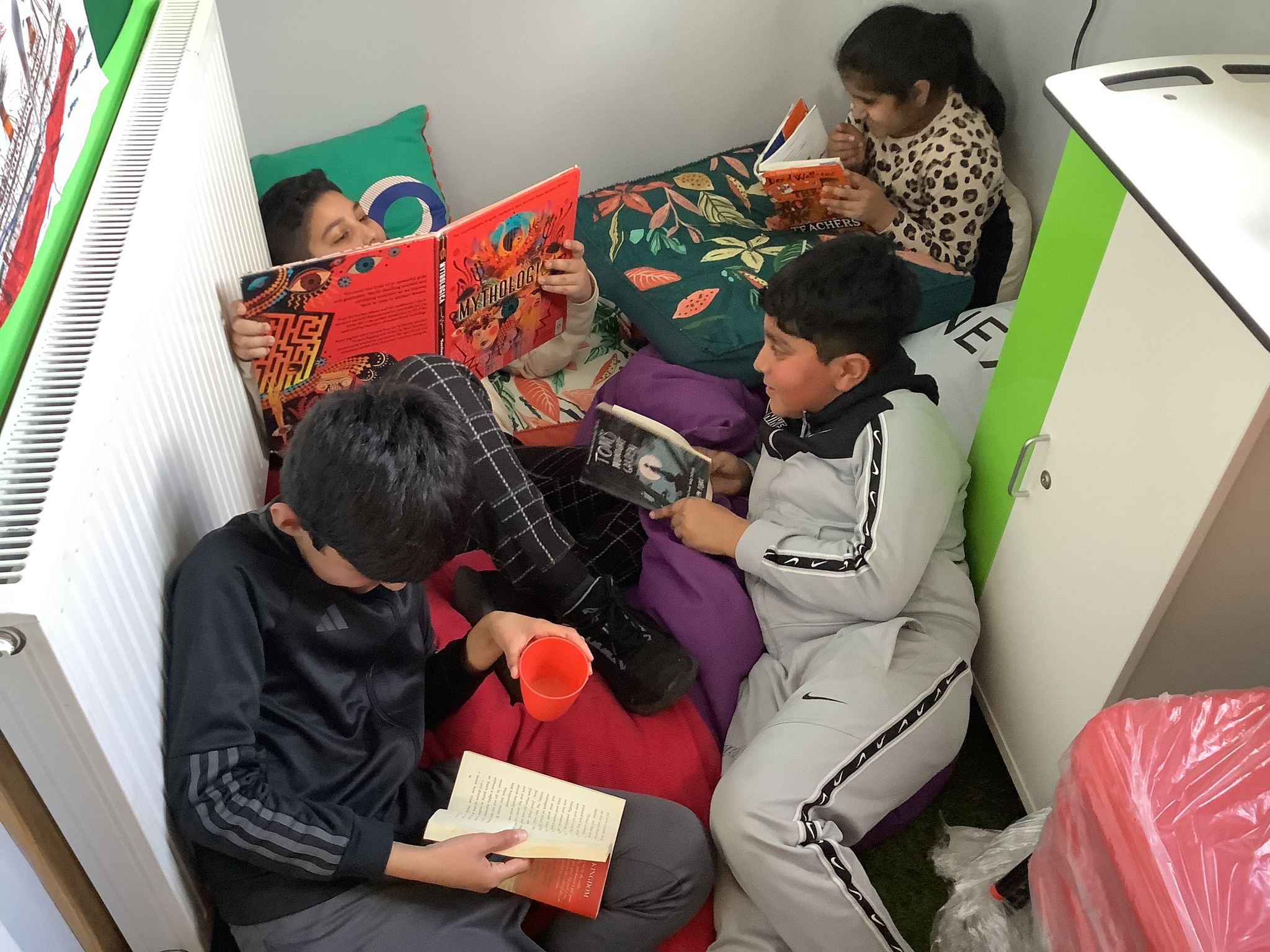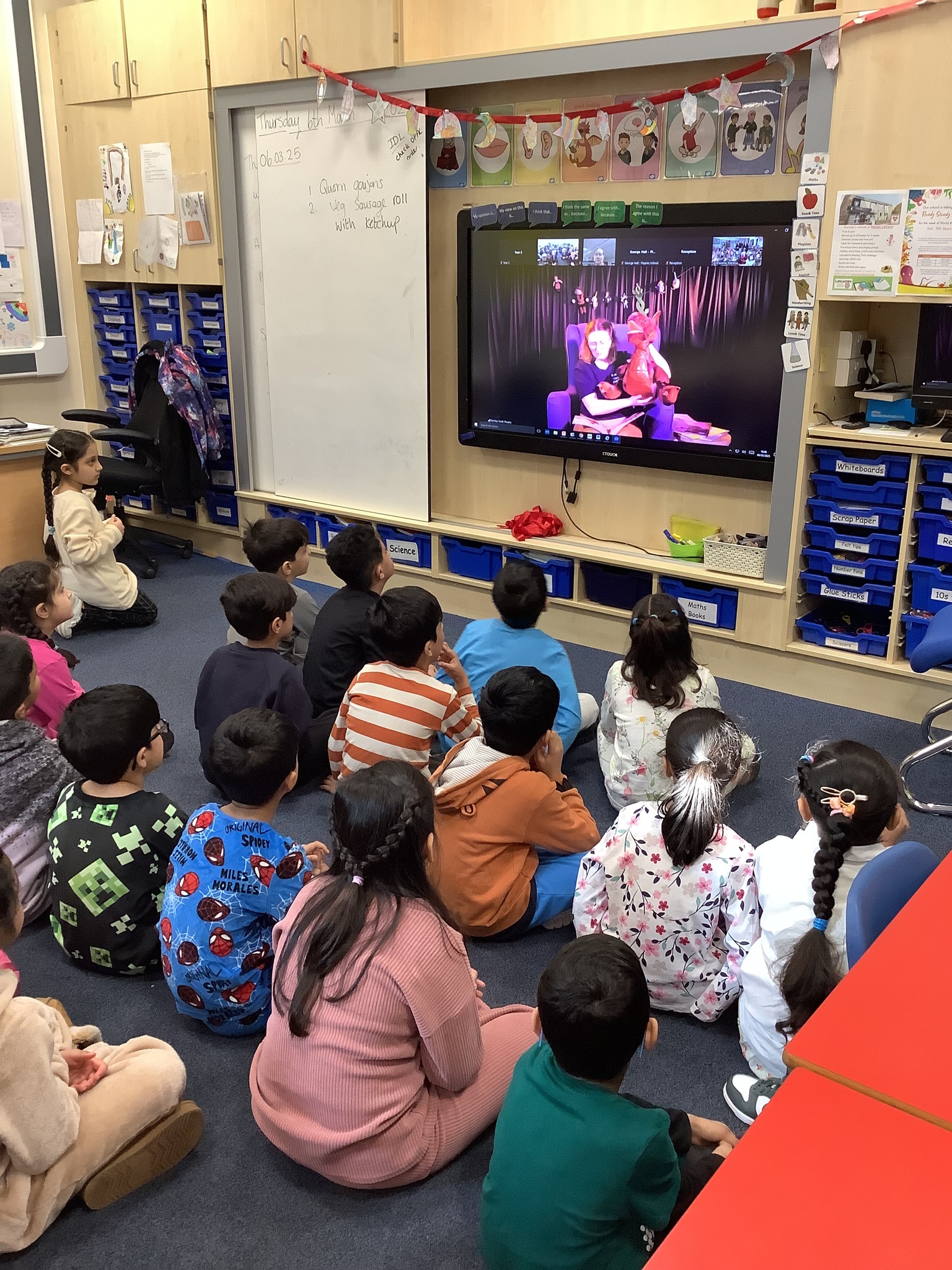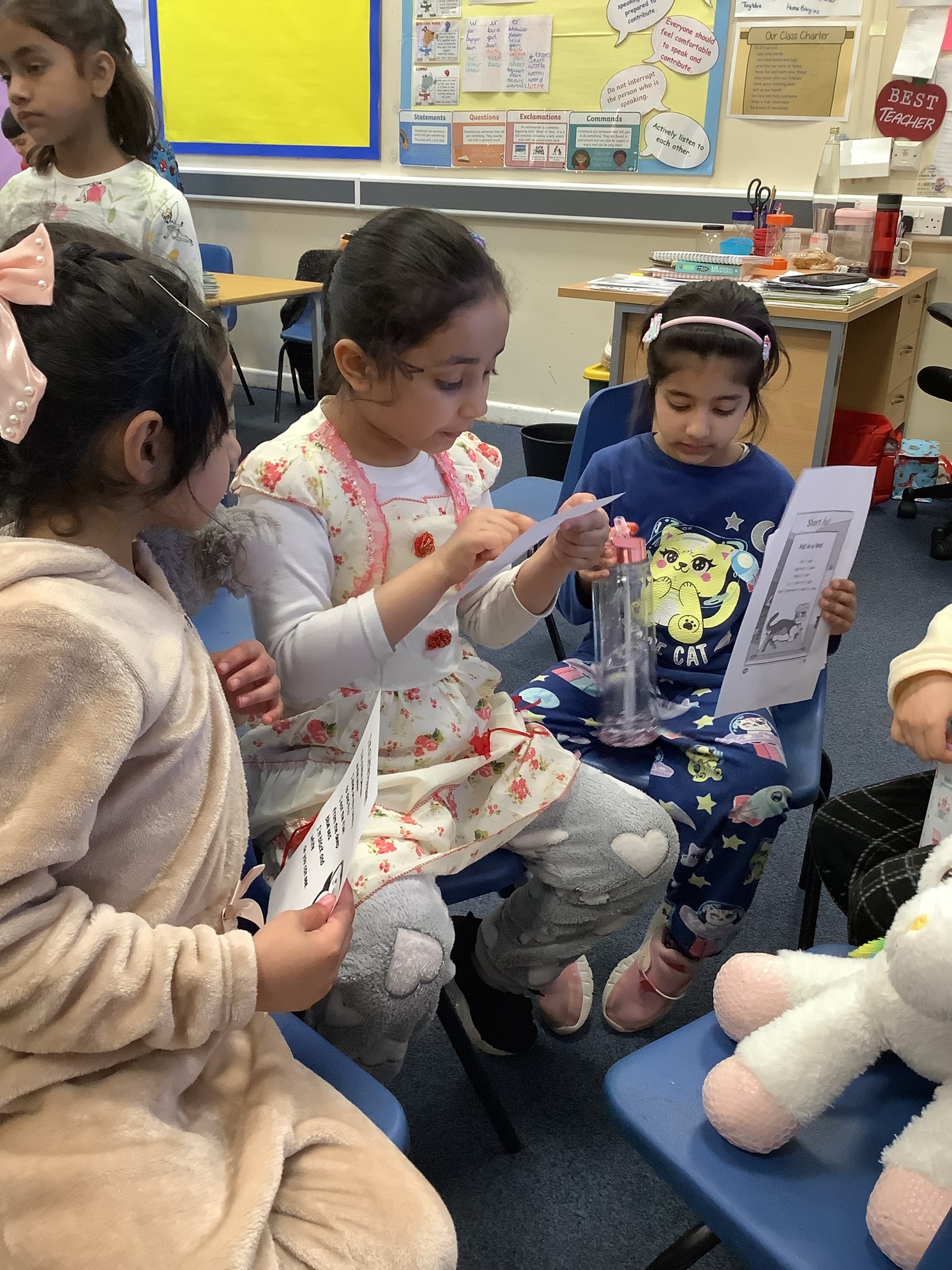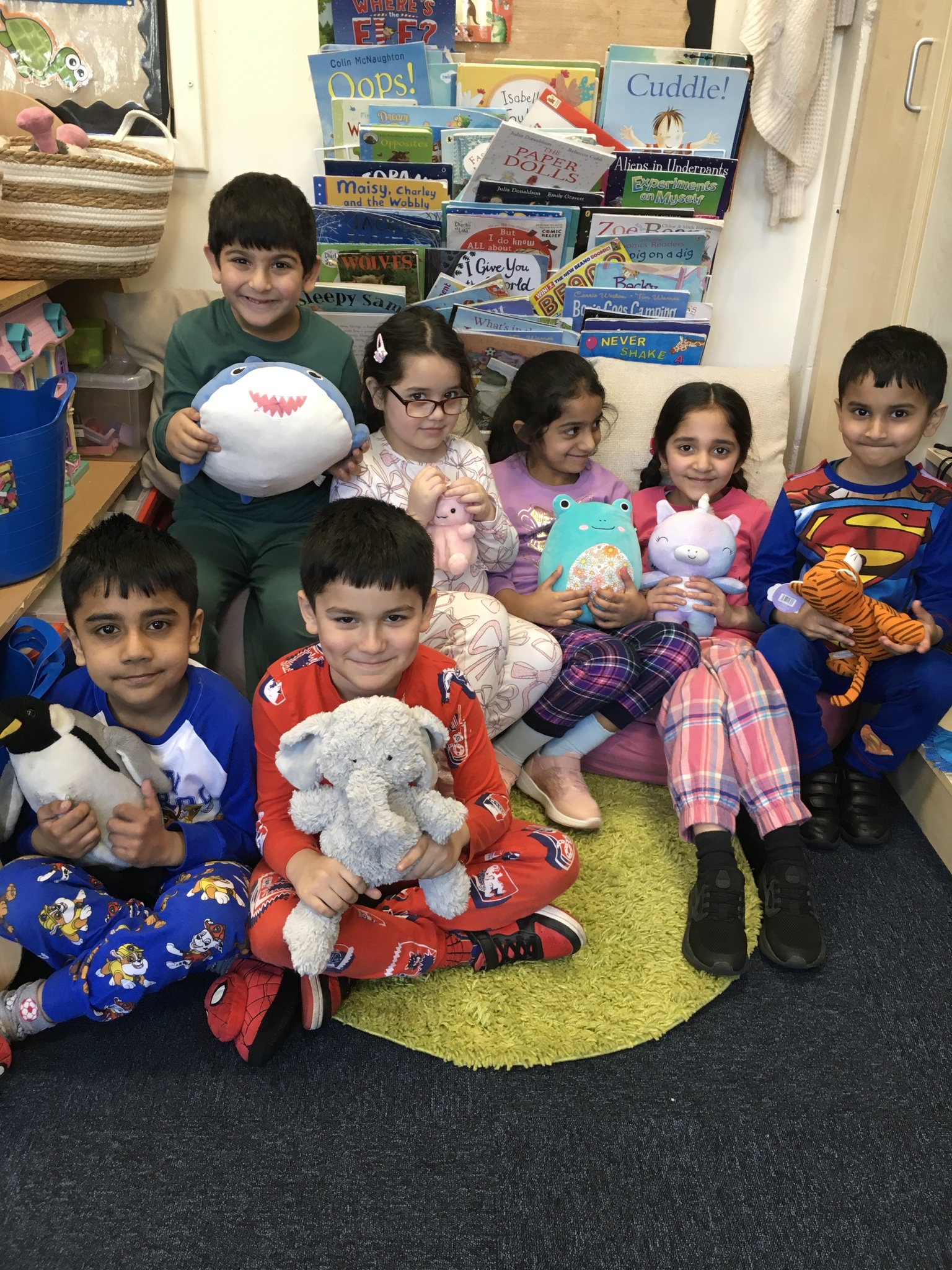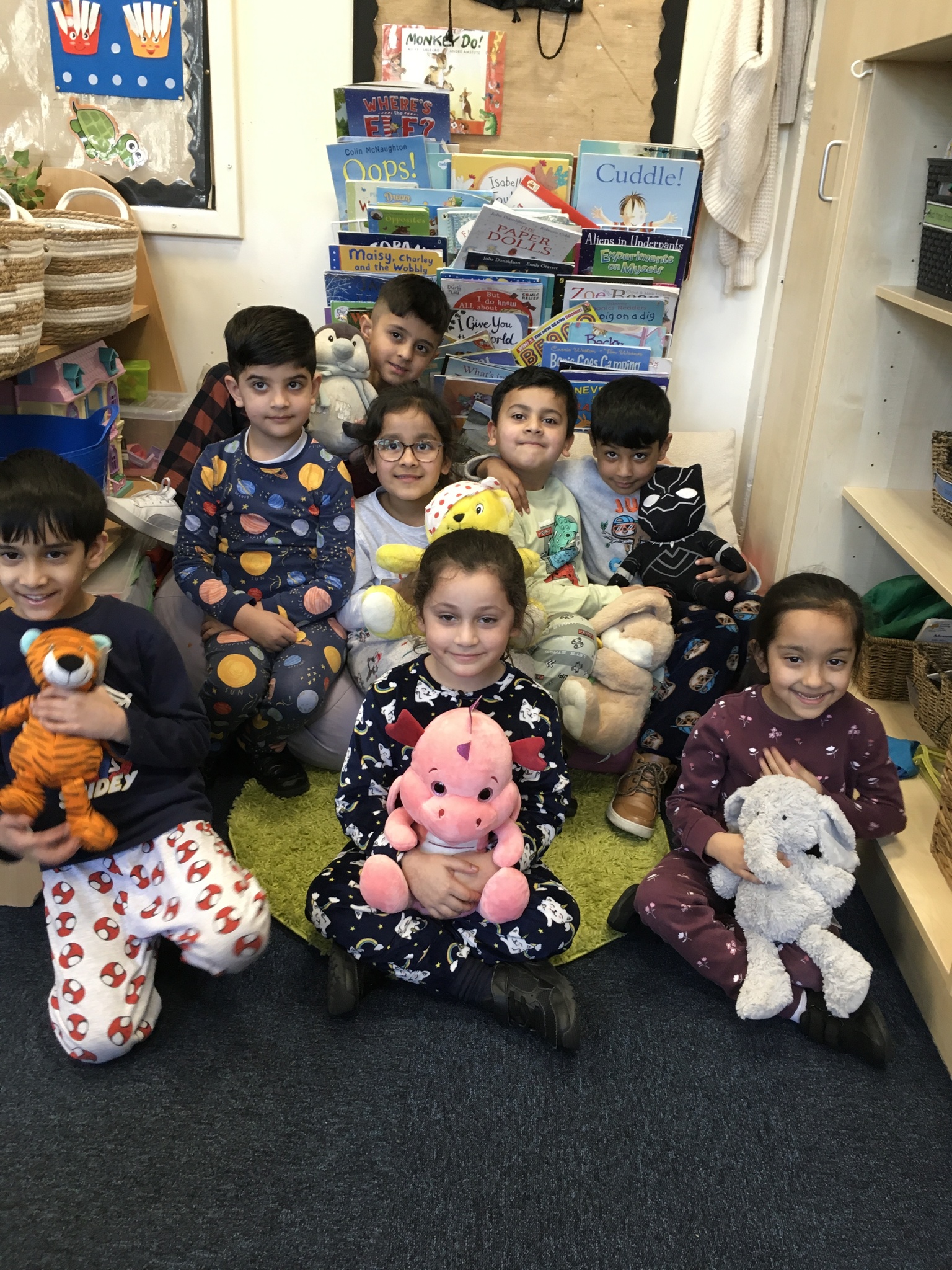
English at Bradley School underpins all aspects of our education and school community. We plan our English curriculum to provide children with the skills they need to be successful in life. Mastering a wide range of English skills is the key to opening the doors to different opportunities as the children grow older.
Speaking and Listening
Beginning in Reception and continuing through all Primary years, the children develop their capacity to express themselves effectively for a variety of purposes. Working with adults and other children, their activities include listening, giving opinions, replying to instructions and questions, describing experiences and feelings. Starting in EYFS and KS1, children re-tell familiar stories using actions and story maps following our ‘Talk for Writing’ approach.
As the children progress through the school, they extend these skills to recount events, tell more complex stories, take on dramatic roles, report, summarise and predict. Children are also provided with opportunities to compose, recite and perform poetry. Class assemblies give the children a chance to showcase their learning to parents and the rest of the school.
It is usual for EYFS children to perform in a Christmas Nativity and Year 6 to end the year with a summer show.
All children starting in EYFS are screened to assess their speaking and listening skills. Early intervention can then be put in place using the WELLCOMM intervention resources for those children that need it.
Reading
At Bradley Primary School, children learn not only the mechanics of reading, but to become accomplished, comprehending readers, developing the habit of silent reading and a love of reading for life.
We base our English lessons around the Lancashire units to ensure we are using high quality literature across the school.
Each class has a designated reading area to help promote the love and high importance that reading holds in our school. We have a fabulous library where there is a range of fiction and non-fiction books which the children are able to take home. We have a team of very willing junior librarians who are all superb advocates of promoting reading for pleasure. A variety of events such as World Book Day and Bedtime Story Day are held annually purely for enjoyment. Our Year 5 buddies listen to children read in KS1.
Parents are encouraged to share a home reading book with their child, listen to them read and write a comment in their Reading Record. All classes hold meet the teachers meetings where home reading is explained to parents.
Writing
Spelling, Handwriting and Composition – These strands go hand in hand throughout the Curriculum.
Children at Bradley Primary School develop a growing ability to write in a range of styles and writing outcomes are always purposeful and seek ‘real’ audiences through publication and display.
Teachers follow the Talk for Writing approach and use oral work as a prelude to most writing tasks and vocabulary is explicitly taught. Writing tasks are broken down into smaller steps with feedback given from the class teacher at different stages (e.g. brainstorming, planning, boxing up, drafting and editing). Emphasis is laid upon drafting, as a process to encourage children to improve the construction, spelling and layout of their written work. Teachers use the Lancashire units to plan from which ensures coverage of the National Curriculum and progression as children move up the school.
Year 2 teachers use the Year 2 Red Rose planning documents to teach spelling which recaps and then follows on from the Red Rose phonics scheme, which EYFS and Year 1 teachers use to deliver our phonics teaching. All children in KS2 have ‘spelling’ books where they note down new vocabulary and their own definition, written in context which they then use in their own work. Much of their writing is developed from the use of high quality literature, as the children respond to plot, character, illustration and ideas. Our aim, over time is to ensure our children become accomplished proficient spellers – much needed in these days of text speak.
Grammar is taught to all children with teachers using the Lancashire units to plan for progression and coverage. Grammar is always linked closely to the literature they are studying.
Children in EYFS and Year 1 develop correct letter formation by using the Red Rose letter formation rhymes. Formal teaching of handwriting is carried out regularly and systematically to ensure Key Stage targets are met. Year 2 and all Key Stage 2 children are taught a cursive style using the 'Letter-join' handwriting scheme.
Impact
The impact on our children is clear: progress, sustained learning and transferable skills. With the implementation of the writing journey being well established and taught thoroughly in both key stages, children are becoming more confident writers and by the time they are in upper Key Stage 2, most genres of writing are familiar to them and the teaching can focus on creativity, writer’s craft, sustained writing and manipulation of grammar and punctuation skills.
As all aspects of English are an integral part of the curriculum, cross curricular writing standards have also improved and skills taught in the English lesson are transferred into other subjects; this shows consolidation of skills and a deeper understanding of how and when to use specific grammar, punctuation and grammar objectives.
English curriculum overview
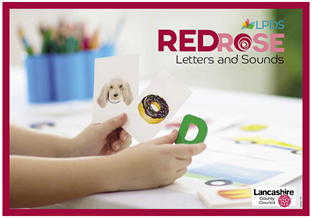
Phonics Overview
Phonics Trajectory
Phonics Terminology
Phonics
Below are some useful websites for practising phonics and some further information.
Please click on the test papers below to practice the tests. You will need Adobe reader to open them. Any problems, please ask a teacher.
Phonics Screening Mock Tests
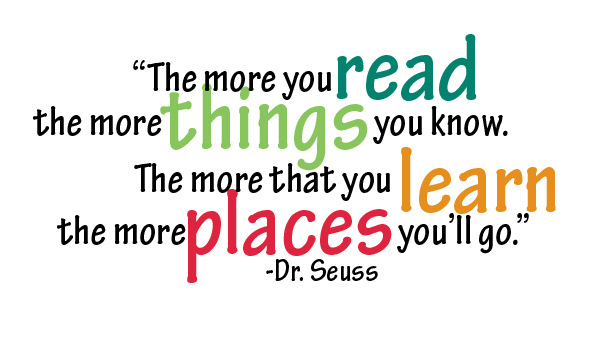
WE ARE A READING SCHOOL
At Bradley, reading is at the heart of everything we do and we are constantly seeking ways to ensure all our children enjoy reading. We provide a whole range of opportunities to expose the children to as many different texts as possible. We know, and the research tells us, that encouraging reading for pleasure is transformative for children’s futures “We are placing a huge focus on 'reading for pleasure' across the school as a way to bridge the vocabulary gap and enthuse pupils to become lifelong readers.”
Reading within the English Curriculum
Reading Curriculum
Reading for Pleasure
Shared Text Time (Story Time)
Through our carefully planned ‘shared text time’ or ‘story time’ as it used to be known, Bradley teachers model how to be an expert reader. At Bradley we recognise the value of reading aloud to children and from EYFS to year 6, daily sessions are planned into our timetable.
For the younger children, we are able to choose from books that the children would not be able to read on their own. This means we can expose them to vocabulary and sentence structures that they may not encounter in their own reading books. Teachers use ‘shared text time’ to promote books and authors that children may not choose to read themselves and so widen the range of books they are likely to read. All classes spend time discussing books they would recommend to others and have these displayed in the classrooms and on classroom doors.
Bedtime Story Packs
Year 1 and Year 2 are encouraged to use our Bedtime Story pack loan system where the children can choose from a range of stories and non-fiction books to share with an adult at home. Displays around Key Stage 1 are used to remind children to change their own books.
Class Reading Areas
All classes across school have a cosy, well organised reading area which invites the children to choose from a range of fiction and non-fiction books. Our fund raising team, ‘Friends of Bradley’ regularly give money to each class to buy new books for the class reading areas. Recently, this money was used in EYFS and key stage 1 to buy forward facing book racks so the children can view and access books more easily.
Reading LAP's
Reading Awards Autumn 24-25
The Bradley Approach to Writing
We use the Lancashire professional development service (LPDS) English units as our main planning tool at Bradley. The LPDS English planning units cover a wide array of opportunities for the children at Bradley to access and innovate different genres related to both fiction and non-fiction.
At the beginning of the school year, we use bridging units to allow the children to apply the knowledge they have developed in the previous year combined with new learning from the year they have moved up to.
For both the bridging units and LPDS units for each year group, the children are provided with a link text, which is designed to hook their interest and develop their understanding of the unit, they learning.
Throughout each unit of work, the children will have two or three outcomes based on a fiction and a non-fiction genre. Throughout the unit, the children will explore various texts related to the unit of work. We follow a phased approach to English, which is clear throughout all the units across the school. The phases of learning are below:
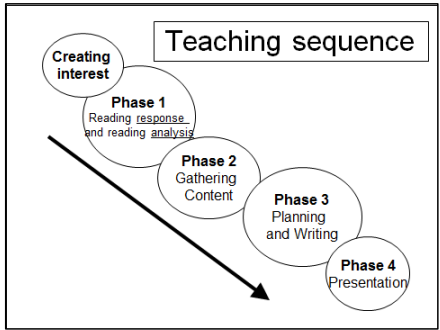
Guided Writing and Independent Writing
Writing is an integrated part of daily life at Bradley; children are encouraged to write as often as possible in a range of situations. During the writing phase, children will work closely with the teacher to develop writing for a specific outcome. This will involve a scaffolded approach to teaching, with a high level of support provided by the teacher and contributions in terms of how to improve writing from the children. This process is enhanced by the children’s learning throughout the unit, in terms of the texts they have used, the grammar they have developed, and the rich vocabulary developed through the phases of learning. In this phase, the children will have many opportunities to receive feedback on their writing and develop it further through editing.
Once the children have developed the skills to write the outcome for their unit, they will be able to apply them to their independent writing. This involves using a similar outcome to the one in the guided writing, but there will be less scaffolding from the teacher and more impetus on the children to develop their writing. Having already written the outcome of the unit, the children will be familiar with the process for independent writing and will be able to use the working wall in the classroom to develop their own writing.
Cross Curricular Writing
Extended writing is planned for across the curriculum and children are expected to use the same skills as taught in English, e.g. applying knowledge of recounts to writing in History
Bradley’s Approach to Grammar
Throughout the LPDS English units, we have daily grammar starter sessions related to final outcomes within the unit. We follow the ‘I’ model for grammar:
- Immerse – this is where we introduce the children to the aspect of grammar being developed
- Imitate – the children will have an opportunity to copy and change examples given to them
- Innovate – the children will be able to change or extend examples of grammar given to them
- Invent – the children will be able to generate their own example using the feature of grammar
- Improve –the children will develop and improve their innovation.
This model is used to give children the opportunity to develop their grammar skills and become more confident in applying them in their outcome for the unit.
Handwriting
During EYFS and Y1, children are taught how to write in a printed style using the Red Rose handwriting rhymes and formation style.
During Year 2 and carrying on into KS2, children use cursive handwriting. We use the Letter Join handwriting scheme; children are encouraged to use a joined, cursive writing style.
Different types of pens, paper and format are used to encourage good presentation and handwriting. Children are able to apply for a pen licence from Year 3 and are encouraged to work towards using an ink pen.
Writing LAPs
Nelson Library
All children visit our local library to access sessions and see how they can become members.
World Book Day
Children (and staff) came to school in their pyjamas on World Book Day. Teachers planned lots of fun activities for them to do, including: reading cafes, book swaps, inviting 'secret readers', participating in a live zoom with authors and so much more.
We ended World Book Day with a superb whole school Poetry Performance. All classes performed a poem to the rest of the school. We focused on intonation, accuracy and pace. The children had great fun!




